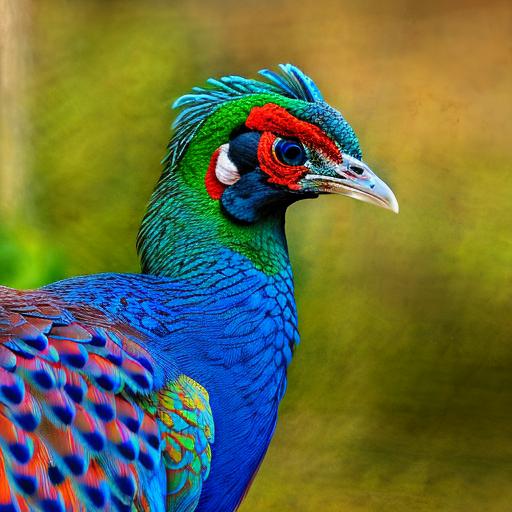Peacocks and chickens are both popular domesticated birds that are often kept for their beauty and utility. While they may share some similarities, such as being members of the bird family, there are distinct differences in their behavior and appearance.
Peacocks are known for their vibrant and iridescent plumage, with the males displaying long and colorful tail feathers. They are native to South Asia and are often kept for their ornamental value. Chickens, on the other hand, come in a variety of breeds and colors, but they do not possess the same extravagant plumage as peacocks. Chickens are primarily kept for their eggs and meat.
Key Takeaways
- Peacocks and chickens have different behaviors and requirements
- Peacocks and chickens can be compatible if introduced properly
- Housing should provide separate areas for peacocks and chickens
- Feeding should be monitored to ensure both species receive proper nutrition
- Health risks can arise if peacocks and chickens are not monitored closely
The Compatibility of Peacocks and Chickens
Before considering keeping peacocks and chickens together, there are several factors to consider. Firstly, it is important to ensure that the housing and feeding requirements of both species can be met. Additionally, it is crucial to assess the compatibility of their behaviors and social hierarchies.
One benefit of keeping peacocks and chickens together is that they can provide companionship for each other. Peacocks are known to be social birds, and having chickens around can help alleviate any potential loneliness or boredom. Additionally, chickens can benefit from having peacocks around as they can act as natural pest control by eating insects and other small pests.
Housing Requirements for Peacocks and Chickens
When it comes to housing requirements, peacocks require more space compared to chickens due to their larger size. A spacious enclosure with plenty of room for them to roam around is essential. Peacocks also need perches or trees to roost on at night.
Chickens, on the other hand, require a coop that provides protection from predators and the elements. The coop should have nesting boxes for hens to lay their eggs comfortably. It is important to ensure that the coop is secure and that there are no gaps or holes that could allow predators to enter.
Feeding Peacocks and Chickens Together
Peacocks and chickens have different dietary needs, so it is important to provide them with appropriate feed. Peacocks require a diet that is high in protein, such as game bird feed or a mix of grains and insects. Chickens, on the other hand, require a balanced diet that includes grains, vegetables, and protein sources such as insects or commercial chicken feed.
When feeding them together, it is important to ensure that each bird has access to the appropriate feed. This can be achieved by providing separate feeding stations or by using feeders that are designed to accommodate both peacocks and chickens.
Health Considerations for Peacocks and Chickens
Both peacocks and chickens are susceptible to certain health issues, so it is important to take preventative measures to keep them healthy. Common health issues for both species include respiratory infections, parasites, and nutritional deficiencies.
Regular veterinary check-ups and vaccinations are essential for maintaining the health of both peacocks and chickens. Additionally, providing a clean and hygienic environment can help prevent the spread of diseases.
Behavioral Differences between Peacocks and Chickens

Peacocks and chickens have different social hierarchies and behaviors. Peacocks are known for their elaborate courtship displays, where the males fan out their tail feathers to attract females. They also have a more complex social structure compared to chickens.
Chickens, on the other hand, have a more straightforward social hierarchy with a dominant rooster leading the flock. They engage in behaviors such as scratching the ground for food and dust bathing.
When kept together, it is important to understand these behavioral differences and ensure that there is enough space for each bird to establish their own territory.
Tips for Introducing Peacocks to a Flock of Chickens
When introducing peacocks to a flock of chickens, it is important to do so gradually. This can be done by keeping them in separate enclosures within close proximity to each other. This allows the birds to become familiar with each other’s presence without direct contact.
During the introduction process, it is important to monitor their behavior closely. Signs of aggression or stress should be addressed immediately. If any conflicts arise, it may be necessary to separate the birds temporarily until they can be reintroduced in a more controlled manner.
The Importance of Supervision and Monitoring
Keeping an eye on the behavior of peacocks and chickens when they are together is crucial to prevent any potential conflicts. It is important to ensure that all birds have access to food and water and that there is no bullying or aggression taking place.
Supervision is especially important during feeding times, as peacocks may try to dominate the food source and prevent chickens from eating. Providing multiple feeding stations can help alleviate this issue.
Potential Risks of Keeping Peacocks with Chickens
While there are benefits to keeping peacocks and chickens together, there are also potential risks that need to be considered. One risk is the transmission of diseases between the two species. Peacocks can carry diseases that are harmless to them but can be detrimental to chickens.
Another risk is aggressive behavior from either species. Peacocks can be territorial and may attack chickens if they feel threatened. Similarly, roosters can be aggressive towards peacocks if they perceive them as a threat to their flock.
Weighing the Pros and Cons of Keeping Peacocks with Chickens
In conclusion, keeping peacocks and chickens together can have its benefits, such as providing companionship and natural pest control. However, it is important to consider the housing, feeding, and behavioral requirements of both species before making the decision to keep them together.
Regular monitoring and supervision are essential to prevent any potential conflicts or health issues. By taking the necessary precautions and providing a suitable environment, it is possible to successfully keep peacocks and chickens together.
If you’re considering keeping a peacock with chickens, it’s important to ensure that their living space is suitable for both species. A well-designed and spacious coop is crucial for the overall well-being of your feathered friends. To learn more about how big a coop needs to be for chickens, check out this informative article on Poultry Wizard: How Big Does a Coop Need to Be for a Chicken? Additionally, if you’re looking for a reliable and easy-to-assemble chicken coop option, the Snaplock Chicken Coop featured on Poultry Wizard might be worth considering: Snaplock Chicken Coop. And if you’re interested in incorporating your chickens into your garden space, you can find inspiration and guidance in this article on creating a garden chicken coop: Garden Chicken Coop.
FAQs
Can you keep a peacock with chickens?
Yes, it is possible to keep a peacock with chickens.
Will peacocks harm chickens?
Peacocks are generally not aggressive towards chickens, but there is a possibility that they may harm them if they feel threatened or if they are competing for food.
What should be the ratio of peacocks to chickens?
It is recommended to keep one peacock for every 4-5 chickens.
What should be the size of the coop for peacocks and chickens?
The coop should be large enough to accommodate both peacocks and chickens comfortably. A minimum of 10 square feet per bird is recommended.
What should be the diet of peacocks and chickens?
Peacocks and chickens have different dietary requirements. Peacocks require a diet that is high in protein, while chickens require a balanced diet that includes grains, vegetables, and protein.
What are the benefits of keeping peacocks with chickens?
Keeping peacocks with chickens can provide a natural pest control solution, as peacocks eat insects and small rodents. Additionally, peacocks can add beauty and interest to a backyard flock.
Meet Walter, the feathered-friend fanatic of Florida! Nestled in the sunshine state, Walter struts through life with his feathered companions, clucking his way to happiness. With a coop that’s fancier than a five-star hotel, he’s the Don Juan of the chicken world. When he’s not teaching his hens to do the cha-cha, you’ll find him in a heated debate with his prized rooster, Sir Clucks-a-Lot. Walter’s poultry passion is no yolk; he’s the sunny-side-up guy you never knew you needed in your flock of friends!







